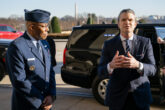August 15, 2017
What America Owes Its Veterans
A Better System of Care and Support
Each year, the U.S. military recruits some 175,000 young Americans. At the heart of its pitch is a sacred promise to take care of those who serve—what President Abraham Lincoln described in his second inaugural address as the national duty “to care for him who shall have borne the battle and for his widow and his orphan.” Today, this promise is enshrined in the ethics of each service: members of the U.S. Army, Navy, Air Force, Marines, and Coast Guard pledge to never leave a fallen comrade behind. After their service, the Department of Veterans Affairs (VA) works to fulfill this same promise on behalf of a grateful nation, enabled by a budget larger than those of the State Department, the Department of Homeland Security, and the entire U.S. intelligence community combined.
Most national security discussions focus on strategy or policy. To the extent that ways and means get considered at all, the talk tends to center on weapons systems, budgets, bases, and buildings. These matter, but people matter, too. Service members are an irreplaceable component of U.S. national security. And because the United States relies on an all-volunteer force, how the country treats its troops during and after their service matters when it comes to sustaining this critical component of national strength.
Read the full article at Foreign Affairs.
More from CNAS
-
National Security Has a Human Capital Problem and There’s No Fast Way Out
National security doesn’t really exist without the military forces and supporting civilians to carry it out. Recruitment remains a problem for the armed forces. And there’s a ...
By Katherine L. Kuzminski
-
The Department of Defense’s Breakthrough Nuclear Moment Risks Slipping Away
Unless they act, the Department of Defense’s breakthrough nuclear moment may vanish before it really happens....
By Will Rogers
-
Sharper: National Security Human Capital
U.S. national security depends on the nation’s ability to leverage the expertise of uniformed warfighters and the highly skilled civilian professionals who develop and impleme...
By Charles Horn & Taren Sylvester
-
Hegseth Brings the Culture War to Combat
The fundamental challenge of military leadership lies in creating cohesive teams that can work together in an environment of mortal risk and, when called upon to do so, use le...
By Dr. Jason Dempsey




